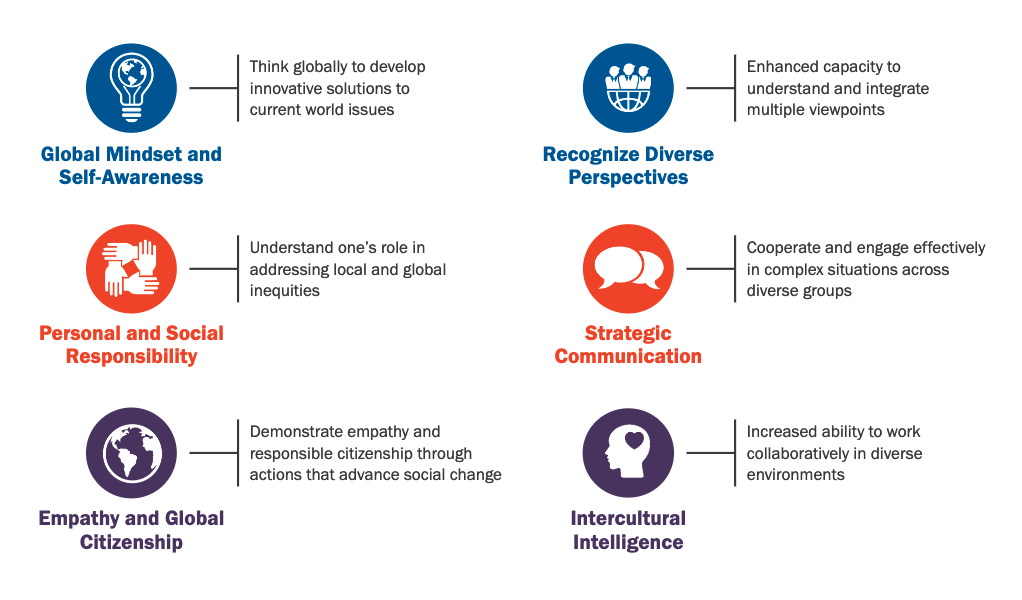Program Learning Outcomes and Curriculum
Your program curriculum is designed to ensure graduates acquire the essential skills, knowledge, and attitudes appropriate and relevant to both the needs of students and employers.
Program Vocational Learning Outcomes
Program vocational learning outcomes describe what graduates of the program have demonstrated they can do with the knowledge and skills they have achieved during their studies. The outcomes are closely tied to the needs of the workplace. Through assessment (e.g., assignments and tests), students verify their ability to reliably perform these outcomes before graduating.
The program vocational learning outcomes for this program are:
1. Create learning contexts to enable, build and maintain caring, responsive relationships* in partnerships with children*, families* and communities that value and respect social, cultural and linguistic diversity*, including Indigenous* peoples’ worldviews and Francophone identity.
2. Co-create, facilitate and reflect upon inquiry and play-based* early years and child care* programs and pedagogical* approaches to support children’s* learning, holistic development* and well-being following children’s* capabilities, interests, ideas and experiences.
3. Co-design and maintain inclusive* early learning environments* to value and support equitable, accessible and meaningful learning opportunities for all children*, their families* and communities in a range of early years and child care* settings.
4. Collaborate with children*, families*, colleagues, agencies and community partners to create, maintain, evaluate and promote safe and healthy early learning environments* to support independence, reasonable risk-taking and healthy development and well-being.
5. Use observation strategies* to identify children’s* strengths and challenges and to ascertain when children* and families* might benefit from additional support or community resources.
6. Use professional communication in interactions with children*, families*, colleagues, employers, the regulatory body*, government authorities and children’s* service agencies to meet legal and ethical standards of the early years sector*.
7. Act in accordance with relevant legislation, regulations, College of Early Childhood Educators Code of Ethics and Standards of Practice, agency policies and procedures and principles of evidence-informed practice* and reflect* upon their impact on one’s own role in early years and child care* settings.
8. Identify, report and document when a child is in a situation of perceived risk for, or actual neglect or abuse, in accordance with legislation, the College of Early Childhood Educators Code of Ethics and Standards of Practice, policies and procedures.
9. Create and engage in partnerships with families*, communities, colleagues, inter-disciplinary professionals, authorities and child service agencies to advocate for quality early years and child care* programs and services.
10. Engage in reflective practice* and continuous professional learning* in accordance with principles of lifelong learning, evidence-informed practices* in the early years sector* and requirements of the College of Early Childhood Educators.
VLO 11 below is specific to ECE Diploma programs that are known as Indigenous* Early Childhood Education Programs (MTCU Code 51211). Graduates of these programs have reliably demonstrated Vocational Outcomes 1-10 in addition to VLO 11.
11. Engage with Indigenous* children*, families* and communities to co-create, implement and evaluate Indigenous* early years and child care* and child and family programs and environments that are culturally* sensitive and culturally* relevant to the communities they serve.
Essential Employability Skills Outcomes
Essential Employable Skills (EES) are skills that, regardless of a student’s program or discipline, are critical for success in the workplace, in day-to-day living, and for lifelong learning. Graduates will reliably demonstrate abilities in six skill categories:
Global Citizenship and Equity Learning Outcomes
There are six Global Citizenship and Equity (GCE) learning outcomes integrated into Diploma and Advanced Diploma programs as a component of Centennial’s Signature Learning Experience (SLE). The SLE reflects the College’s promise to provide students with a distinctive and inclusive educational experience that builds on a foundation of global citizenship, equity, and social justice. Certificate and Graduate Certificates also include at least two GCE learning outcomes. The GCE learning outcomes are:
- Identify one’s role and responsibilities as a global citizen in personal and professional life.
- Identify beliefs, values and behaviours that form individual and community identities and the basis for respectful relationships.
- Analyze issues of equity at the personal, professional, and global level.
- Analyze the use of the world’s resources to achieve sustainability and equitable distribution at the personal, professional, and global level.
- Identify and challenge unjust practices in local and global systems.
- Support personal and social responsibility initiatives at the local, national, and global level.
Global Citizenship and Equity Portfolio
As a component of the SLE, Diploma and Advanced Diploma program students will complete the Global Citizenship and Equity (GCE) Portfolio. Building the GCE Portfolio is a process of documenting your GCE learning. Each item selected for inclusion in the portfolio demonstrates growth and understanding of Global Citizenship and Equity within your program of study.

Global Skills Portfolio
Students are encouraged to develop their GCE Portfolio beginning in their first semester. You will add artifacts from coursework and accompanying reflections as well as artifacts arising from co-curricular activities, volunteering, etc. to your portfolio as you progress through the program. You are encouraged to use the ePortfolio tools available on eCentennial, as well as to develop an online professional portfolio presence through LinkedIn and/or other personal websites/blogs.
Curriculum Framework
The Early Childhood Education Program at Centennial College is committed to ensuring graduates are prepared to be leaders in the profession. Our graduates are respected as professionals.
All Early Childhood Education Courses and COMM160/161 must be completed at a “C” Grade to be recognized as a passing grade.
Each Semester has pre-requisites and co-requisites that must be completed prior to progressing from one level of their program to the subsequent level.
You are allowed to repeat a course two times. A third repeat will require the Dean or a designates approval. Students who fail the same Early Childhood Education Course three (3) times will be suspended from the ECE program indefinitely.

